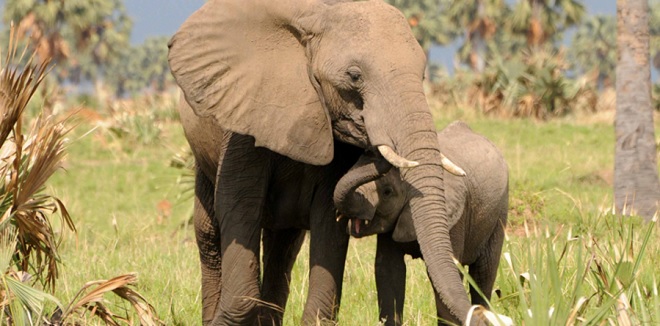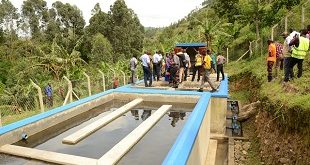
Kampala, Uganda | THE INDEPENDENT | The Financial Action Task Force (FATF) – the global anti-money laundering watchdog— estimates that environmental crime is one of the most profitable criminal enterprises, generating around USD 110 to 281 billion in criminal gains each year; however, its latest figures suggest that less than 1 percent of the profits are recovered.
Marilyne Pereira Goncalves, Senior Financial Sector Specialist with the World Bank says this should worry us all.
She observes that every year, criminals make millions of dollars by illegally harvesting and trafficking our planet’s natural resources. Their crimes cover a wide range of activities, from illegal logging to poaching and trafficking of endangered species, illegal mining, and waste trafficking.
According to Goncalves, while the environmental crimes themselves often occur in developing and resource-rich countries, criminals tend to move and launder their profits globally.
“They often rely on a mix of front companies and corrupt actors to move criminal profits undetected,” she notes Experts have found that environmental crimes need to be found for our own survival. Uganda has not been speared of crimes like illicit logging, poaching of wildlife like elephant tusks and pangolin scales among others.
According to Wild Aid, in recent years, Uganda has fought hard to reduce wildlife poaching within its borders and to reverse its reputation as a hotspot for the smuggling and trafficking of illegal wildlife products to Asia. All wild animal species are protected under Ugandan law and a new wildlife act introduced in 2019 sets out extreme prison and monetary penalties for wildlife crimes.
Goncalves says environmental crimes have huge human costs; indeed, the survival of our planet could depend on how effectively we can tackle the threat. “Yet, till now, these types of crimes have been given lesser importance than other financial crimes, such as tax crimes or fraud,” she said.
She observes that we spend millions of dollars on solutions for climate change, but most countries spend next to nothing on recovering the proceeds of climate-related crimes.
“This is important as following the money often helps identify and bring down the wider networks and kingpins behind these crimes,” suggests Goncalves In recent years, there has been increased attention on the global need to follow the money from environmental crimes.
Part of those efforts resulted in the passing of the Uganda Wildlife Act in 2019. The significantly strengthening penalties for wildlife crime.
In 2022, Uganda handed down its first life sentence to an illegal ivory dealer, in the famous Ochiba Pascal landmark case before The Standards, Utilities, and Wildlife Court case.
The Court convicted Ochiba Pascal for unlawful possession of protected species after being found in possession of two pieces of elephant ivory weighing 9.55 kilograms without a wildlife use right.
This week, the European Union removed Uganda from the anti-money laundering blacklist by the Financial Action Task Force (FATF). It said Uganda had improved in Ati-money laundering nod Counter-terrorism. FATF also works in fighting money laundering from environmental crimes and raises awareness about the financial flows that fuel crimes such as illegal logging.
According to FATF’s former President, Marcus Pleyer, environmental crime is one of the most profitable criminal enterprises. It covers a wide range of unlawful activities such as illegal logging, illegal wildlife trade, and waste trafficking.
“Neither crime nor finance are limited to national borders, so to achieve our goals on tackling illicit finance we need to work with all countries,” he said.
In February this year, FATF’s urged for the implementation of recommendation 25 on the beneficial ownership and transparency of legal arrangements in to enhance transparency of beneficial ownership globally and prevent criminals and terrorists from hiding their activities and funds behind complex corporate structures and legal arrangements such as trusts.
Beneficial owner refers to the natural person(s) who ultimately owns or controls an entity and/or the natural person on whose behalf a transaction is being conducted
Experts have found that environmental crimes are usually mixed with legal activities to hide its illicit character. They say banks (Financial Institutions) can play an important role here, as they are part of international trade through provided services.
As an example, in 2022 the Basel Ant-Money Landering Index (AML) added environmental crime data to its indicators of money laundering and terrorist financing. This indicator had 5% weighting and is based on the Global Organized Crime Index, measuring risks connected to environmental crimes and first published in 2021.
In 2020 and 2021, the German and Chinese Presidencies to the FATF prioritized this issue and developed two public reports for countries on how to detect and investigate the laundering of money from environmental crimes. Goncalves notes that while this was an important step, the topic has since fallen out of the policy spotlight.
“The real challenge now is how to get countries to regain and maintain this momentum and translate it into action on the ground,”
In August last year, WildAid said East Africa’s ports are on the frontline in the fight against illegal wildlife trafficking. It said products from all over Africa pass through the region on their way to Asia and other destinations. It called on efforts to sensitize port workers about the value of wildlife to their countries if they are to fight environmental crime. Smuggled wildlife products are normally concealed in illegal shipments.
What Needs to be Done?
For this to happen, there needs to be a coordinated effort from governments, the FATF, and the public itself. Marilyne Pereira Goncalves suggests that countries need to bring financial crime and anti-money laundering expertise into public-policy dialogue on environmental protection and climate change.
“In most countries, there has been very little coordination between agencies responsible for money-laundering prevention and those responsible for environmental protection,” she said.
according to Goncalves, case studies show that criminals involved in environmental crimes often launder their profits in plain sight, using legal markets to mix legal and criminal proceeds. And that criminals misuse the same Anti-Money Laundering weaknesses as fraudsters or tax criminals, who rely on gaps in information on ultimate owners behind companies and weak international cooperation.
“This highlights the need for both developed and developing countries to address long-standing gaps in their AML frameworks and ensure that AML experts partner with a wider range of public and private sector partners to detect anomalies,” she urged.
Goncalves further suggests that the public has an important role to play in helping to ensure environmental crimes are treated seriously and that criminals are sanctioned. This includes encouraging public sector efforts to strengthen expertise in this area, and actions to follow and recover criminal gains from such crimes.
******
URN
 The Independent Uganda: You get the Truth we Pay the Price
The Independent Uganda: You get the Truth we Pay the Price


